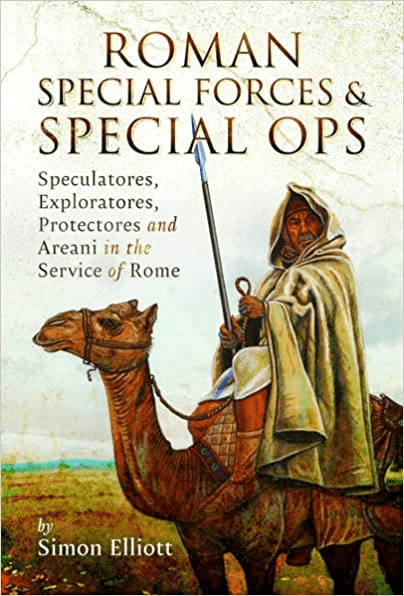
Much has been written about the Roman army and the mighty legions that conquered their empire and then defended it for centuries against all comers. But little has been written about the men and units employed when something more subtle than the march of legions into pitched battle was required. This is the only book available dedicated to Roman special ops and the role of the Speculatores, Exploratores, Protectores and Areani.
Simon Elliott reveals the kinds of special operations conducted by the tactical scouting ahead of the legions, covert strategic reconnaissance in neighboring states, espionage, assassination or abduction of dissidents and enemies, counter-insurgency, and close protection of Roman officials and commanders. While such missions were frequently executed by ad-hoc units or individuals detailed for that specific mission, the author goes on to reveal the evidence for the aforementioned specialist units. He concludes with an analysis of the extent to which these various forces corresponded to a modern conception of Special Forces. These men were the eyes and ears of the Empire, the deadly tip of the Roman sword.
Review
If one were to say the term, secret special forces, and associate that with the Roman Empire I’m not sure they would have a proper idea of what that meant, for the history of the Roman Empire and the Roman Army is so vast. It is as extensive from the beginning of Rome till its end. This book has a solid understanding of the events of Roman History, ranging from the Republic to the Late Empire. And Simon goes extensively into the many varieties of spy organizations, special forces that would be known as the explorates (I am simply condensing it because there are a lot of Latin names mentioned for a degree of military and state organizations that evolved).
You might be interested to hear that when a Roman Legion had to defeat a marauding Briton army, the Roman General at that time ordered his Batavain Auxiliaries that were comfortable swimming in full armor to harass the Britons at night. What did the Batavian Auxiliaries do? They either poisoned the horses or slit their throats. While revolting, it did the job of preventing the Britons from using their chariots, and the job was done. Or you might want to know how different spy organisations that were made by the Emperors, were never really trusted by them. How did Ceasar achieve his victories in Gaul?
Because he had an informed spy network during his campaign, gathered intelligence and struck at the right moment. Without this spy network, certain Roman units being designated for specific roles, the function of the Roman Army would have been less cumbersome. In many cases, the Emperors of Rome distrusted the Praetorian Guard and often distrusted the informer networks that they had (not all). There’s so much richly packed detail h
At the end, this book covers a lot of the Roman provinces, from Britannia to Rome, and to Egypt and North Africa. At the same time I felt there is so much to be uncovered, that I would read a 500 page book detailing in far more detail about the Special Forces of Ancient Rome. I would also go into detail exploring the naval aspect of the Roman Empire, and see how special forces and spy networks played a crucial role in maintaining Rome’s role. This book is a good introductory to the special forces of the Roman Empire and it’s spy networks. I just need a longer book. It’s a fantastic oversight of an fascinating history of the Roman Army that’s rarely explored!









Leave a Reply